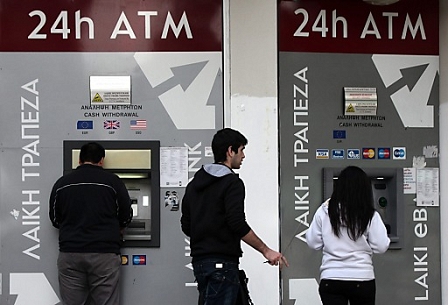Erstellt am: 18. 3. 2013 - 15:30 Uhr
Could Cyprus crash the Euro?
Subscribe to the Reality Check podcast and get the whole programme after the show.
Just when it had all gone quiet on the Euro crisis front, the ever-running story of gloom and doom takes a fascinating new plunge.
It's not Greece, or Spain, or Italy, or Portugal that has set a new depth, but Cyprus, and it's happened in a most peculiar way.
In the grand game of bailouts, Cyprus has so far been something of an "also ran". Certainly, it has financial problems, but not on the scale of the big boys of the bailouts, and no one seemed to be taking it that seriously, least of all the Cypriots. Assured by their politicians that, while a bailout was needed, everyone's personal fortunes were safe, no one was prepared for the bombshell that President Nicos Anastasiades dropped on Saturday. Everyone with a Cyprus bank account would have to pay a one-off special tax, with those holding less than 100.000 Euros paying 6.75% and those with over, 9.9%.

EPA/KATIA CHRISTODOULOU
The thunder of feet rushing for the Automatic cash machines was deafening, and resounded around Europe. Markets dipped as soon as they opened this morning, and Russia's President, Vladimir Putin, called the tax "unfair, unprofessional and dangerous." His reaction was, perhaps, to be expected given that Cyprus is a preferred offshore banking option for Russian banks and businesses. Not surprisingly, he was miffed that Russian businesses would be paying for Cyprus' bailout.
Apart from the Russian complaints, on the surface, the Cyprus government's line that it is the lesser of two evils makes sense: a short, sharp shock in the form of a one off tax, or the prolonged years of misery and austerity as the Greeks have been suffering. In that light, perhaps it doesn't look so bad. If everyone pays the tax, but is then secure in their jobs and knows public services will continue undisturbed, perhaps it is a relatively small price to pay.
However, whichever way you look at it, the tax levy is inherently unfair. It targets people with bank accounts (presumably those who keep their money in socks under the bed are exempt) and penalises those who have saved more heavily than their more spendthrift neighbours. It also seems to be very arbitrary. A snapshot of whatever anyone has in their account at any particular moment is hardly representative of their wealth.
Already the government is back peddling, and saying that perhaps the percentages can be re-negotiated - but that's not likely to cut much ice with the shocked and disillusioned Cypriots, according to our correspondent Nathan Morley in Nicosia.
Dieses Element ist nicht mehr verfügbar
However, disgruntled as Cypriots may be, thing could be about to get a whole lot worse, according to analyst Emmanuel Sigalas at the Vienna based Institute for Advanced Studies. He says that if the two vulnerable Cyprus banks crash this week, the Euro itself will start to collapse. Cyprus will be forced to leave the Euro, and while that won't necessarily mean others following immediately, it is almost inevitable that they eventually will, meaning the Eurozone will shrink, and possible vanish altogether.
Dieses Element ist nicht mehr verfügbar
Controling the arms trade
Helen Hughes of Amnesty International explains the treaty designed to prevent "irresponsible arms deals".
Dieses Element ist nicht mehr verfügbar
Israel's new government
More secular, but firmly on the right. After nearly two months of negotiations, new coalition is finally in place and was sworn in today

EPA/ABIR SULTAN
The king-maker turned out to be the charismatic former TV presenter, Yair Lapid, who will be the new Finance Minister, despite having no formal political experience.
The look of Israel's new government, as engineered by Prime Minister, Benjamin Netanyahu, is explained by historian and writer, Tom Segev .
Dieses Element ist nicht mehr verfügbar
Life at the bottom of the oceans
Much to the surprise of most scientists, life has been discovered at the deepest part of the ocean, 11 km below the surface. Dr Robert Turnewitsch of the Scottish Marine Institute explains what they found and why it is important.
Dieses Element ist nicht mehr verfügbar
FM4 Reality Check
Monday to Friday from 12.00 to 14.00, and after the show via Podcast or fm4.orf.at/realitycheck.


